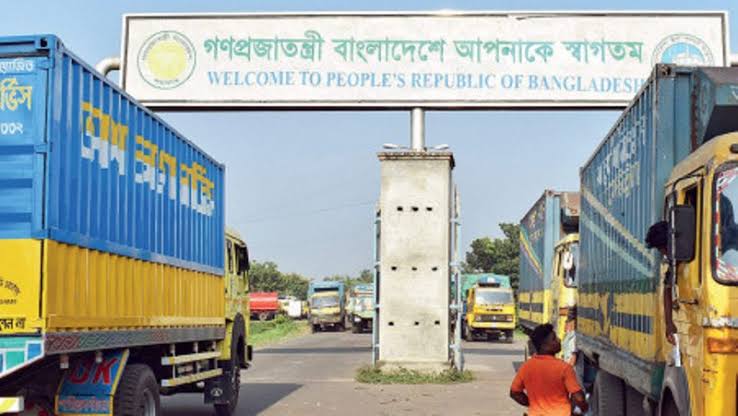Anbarasan Ethirajan
Published:2025-05-03 07:04:39 BdST
Businesses count costs as India, Bangladesh impose retaliatory trade restrictions
Businesses are bracing for possible impact as neighbours India and Bangladesh have recently imposed tit-for-tat trade restrictions, and as both sides appear to be considering more retaliations following months of verbal sparring, according to Anbarasan Ethirajan, South Asia editor for the BBC.
Last month, Bangladesh restricted land imports of cotton yarn from India to shield local industries from cheaper imports.
Dhaka's move came days after India abruptly stopped the transhipment facility it had offered Bangladesh to export its cargoes to third countries via its ports and airports, citing "congestion".
The halt could wipe out $1 billion worth of apparel export prospects for Bangladesh. Now, there are talks in Dhaka the government should go beyond simply pausing Indian cotton imports.
Many in Dhaka think, authorities should consider halting the wide-ranging transit facilities given to India, allowing the mainland to do business with its northeastern region at significantly lower cost.
"I think there is a strong view nowadays in Bangladesh that we should also reassess the other transit and transhipment facilities given to India [for its north-eastern states] by the earlier [Hasina] government," Debapriya Bhattacharya, a senior economist with the Centre for Policy Dialogue in Dhaka, tells the BBC.
Relations between the countries have soured since former Prime Minister Sheikh Hasina was ousted in August after massive protests. She is currently in exile in India and an interim administration headed by Nobel Peace Prize laureate Muhammad Yunus is in charge.
Since then Dhaka has demanded Hasina be extradited to face charges of crimes against humanity, money laundering and corruption. Hasina denies the accusations against her, and Delhi has not officially reacted to the demand.
India has also frequently criticised reports of attacks on the minority Hindu community in Bangladesh. It recently said the alleged killing of a Hindu man "reflects a pattern of systematic persecution under the interim government".
Bangladesh, a Muslim-majority nation, denies targeting minorities, calling most incidents politically motivated or ordinary crimes. Hindus make up less than 10% of its 170 million population.
Sharp official reactions from both sides are also influencing public opinion in India and Bangladesh. There is a growing anti-India sentiment in Bangladesh, with Indian media accused of exaggerating the attacks on minorities and Islamist threats.
The people-to-people ties built over years seem to be on the retreat, and analysts point out that if both sides fail to stay calm, their actions could harm trade and economic relations.
Yarn, vital for Bangladesh's clothing factories, can still enter by sea and air – but they are slower and costlier routes.
In 2024, India had exported $1.6bn (£1.2bn) worth of cotton yarn to Bangladesh, a third of it via land ports.
The now-halted transhipment facility let Bangladeshi exporters send clothes made for high-end brands by road to Indian cities, from where it would be flown to Europe and the US. A group of Indian garment manufacturers have also made a call for preventing Bangladeshi apparel imports into India.
"The transshipment suspension is a blow [to Bangladesh's fast-fashion export industry]," says Anis Ahmed, head of supply chain firm MGH Group, which ships for European fast-fashion brands. "The India route got cargo to Western countries in a week. By sea, it takes up to eight weeks."
Bangladesh, the world's second-largest garment exporter after China, shipped $38bn in clothing last year. Over $1bn of this moved via the India land-air route, which Ahmed says was thriving.
Limited air freight capacity and under-equipped airports hamper direct exports from Bangladesh.
Many see Delhi's withdrawal of the transhipment facility as a response to remarks by Yunus during a recent China visit.
Yunus had called Bangladesh the "only guardian of the ocean" for India's landlocked north-east and suggested that the region could become an "extension of the Chinese economy."
Leaders from India's north-eastern states called the comments "offensive".
Yunus's remarks, spotlighting India's strategic vulnerability in the region to China, raised alarms in Delhi.
Bangladeshi analysts say Yunus's remarks were misinterpreted and aimed at promoting regional connectivity.
During his China visit, Dhaka also welcomed Beijing's interest in a $1bn Teesta River project in northern Bangladesh.
Indian analysts warn that Chinese involvement in the project, which is not far from the strategic Siliguri Corridor, could unsettle Delhi.
But there is concern on both sides over the frosty ties.
Delhi-Dhaka tensions are also rising due to growing ties between Bangladesh and Pakistan.
Bangladesh, once East Pakistan, fought for independence in 1971 with Indian support. Hasina distanced herself from Pakistan during her 15-year rule.
Pakistan's Foreign Secretary Amna Baloch visited Dhaka last month, the first such visit in 15 years. A planned visit by Pakistan Deputy PM Ishaq Dar was postponed due to tensions between Delhi and Islamabad over the deadly militant attack in Indian-administered Kashmir last week.
"I don't think there is any concern over Dhaka's reachout to Pakistan. If there is any suggestion that there is an intent to work together and make things difficult for India, then that will obviously cause concern," says Saran, the former Indian diplomat.
Unauthorized use or reproduction of The Finance Today content for commercial purposes is strictly prohibited.


